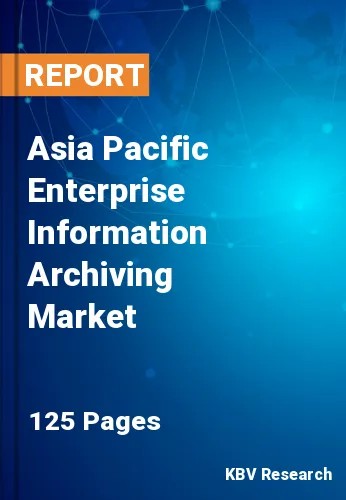The Asia Pacific Enterprise Information Archiving Market would witness Market growth of 15.7% CAGR during the forecast period (2022-2028).
The dilemma of how to store structured and unstructured data is addressed by enterprise information archiving. Corporate databases used to include exclusively structured data, neatly organized in tables for consistency. Companies are looking at ways to save their unstructured data, such as PowerPoint and SharePoint files, which may contain a lot of company data in a combination of text and visual components, as part of the enterprise information archiving. Since these data sources are less structured, they necessitate different techniques of archiving, storage, and retrieval, necessitating the development of enterprise information archiving systems and resources that can handle a wide range of materials.
The increasing necessity for cost-effective storage solutions for idle data to fulfill compliance and legal requirements has fueled the expansion of the enterprise information archiving industry. The demand for enhanced business processes through the separation of less valuable data from online enterprise data is another development driver for the enterprise information archiving industry. Furthermore, cloud-based archiving opens up new avenues for growth in the enterprise information archiving Market .
India, like many other countries throughout the world, has taken a progressive approach to telecom sector reform, with selective privatization and managed competition in various categories. At the start of this decade, the competition was also established in national long-distance (NLD) and international long-distance (ILD) telecommunications. The current policy stance affecting India's telecom sector is presented. The fixed-line service is dominated by two state-owned public sector companies with a considerable user base. In the early part of this decade, these two PSEs were granted tardy admission into the cellular Market . As a result, their cellular subscriber base is insignificant in comparison to private operators. In June 2002, they had only 0.2 million cellular customers out of 7.3 million in the country.
The China Market dominated the Asia Pacific Enterprise Information Archiving Market by Country 2021, and would continue to be a dominant Market till 2028; thereby, achieving a Market value of $1,379.3 million by 2028. The Japan Market is poised to grow at a CAGR of 15% during (2022 - 2028). Additionally, The India Market would witness a CAGR of 16.4% during (2022 - 2028).
Based on Component, the Market is segmented into Content and Services. Based on Content Type, the Market is segmented into Email & Web, Database, Social Media, Instant Messaging, File, Enterprise file synchronization & sharing, and Others. Based on Vertical, the Market is segmented into BFSI, Government & Defense, Manufacturing, Telecom & IT, Retail & Consumer Goods, Healthcare & Life Sciences, Education & Research, and Others. Based on Deployment Type, the Market is segmented into On-premise and Cloud. Based on Organization Size, the Market is segmented into Large Enterprises and Small & Medium Enterprises. Based on countries, the Market is segmented into China, Japan, India, South Korea, Singapore, Malaysia, and Rest of Asia Pacific.
Free Valuable Insights: The Worldwide Enterprise Information Archiving Market is Projected to reach USD 17.1 Billion by 2028, at a CAGR of 15.1%
The Market research report covers the analysis of key stake holders of the Market . Key companies profiled in the report include Microsoft Corporation, Hewlett-Packard Enterprise Company, IBM Corporation, Google LLC, Dell Technologies, Inc., Barracuda Networks, Inc. (Thoma Bravo), Veritas Technologies LLC (The Carlyle Group), Proofpoint, Inc., Mimecast Limited, and Smarsh, Inc.
By Component
By Vertical
By Country
Our team of dedicated experts can provide you with attractive expansion opportunities for your business.

